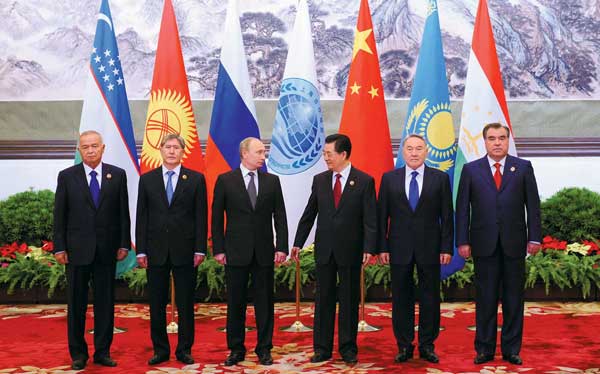SCO members outline bloc's strategy
 0 Comment(s)
0 Comment(s) Print
Print E-mail China Daily, June 7, 2012
E-mail China Daily, June 7, 2012
Leaders of the six-member Shanghai Cooperation Organization began to forge a path ahead for the bloc, as they kicked off their annual summit, amid a rapidly changing regional and global landscape.
 |
|
President Hu Jintao and leaders of the member states of the Shanghai Cooperation Organization meet at the Great Hall of the People in Beijing on Wednesday. [Zhong Xin / China News Service] |
After a slew of bilateral meetings on Tuesday, the leaders of the bloc, which groups China, Kazakhstan, Kyrgyzstan, Russia, Tajikistan and Uzbekistan, held their first meeting on Wednesday afternoon.
The summit focused on consolidating unity and planning direction.
Trade, food and energy security were identified as key areas of cooperation and new funding models were explored.
The summit will continue on Thursday and will be joined by leaders and officials from the bloc's observer and dialogue partners.
President Hu Jintao told the summit that the members should enhance economic cooperation and be better prepared to navigate the choppy waters of the global economy.
He also urged members to coordinate closely on important regional issues, and step up support for each other on matters relating to territorial integrity, national security, social stability and development.
The president called on the bloc to enhance its cooperation with other multinational groups to expand its global influence.
Founded in 2001, the SCO has become an important player in regional affairs, especially regarding development, combating terrorism, separatism and extremism, drug trafficking and cross-border crime.
In a written interview with the People's Daily newspaper, Hu stressed regional security.
Hu said that the organization will also play a greater role in Afghanistan's "reconstruction".
The SCO was set up to primarily focus on security concerns. But experts said the organization is expected to shift the focus of cooperation from politics to economic projects in the next 10 years.
The summit is expected to yield important agreements on political, economic and security cooperation, diplomats from the member countries said.
A program on fighting terrorism, separatism and extremism for the 2013-15 period will be ratified. The bloc will also speed up its work in building a transport network covering all SCO members. The establishment of a regional investment bank to fund key projects in the region is also a priority.
The Beijing summit represents an important moment for the SCO to plan its development as it enters its second decade, Zhang Deguang, former Chinese ambassador to Russia, said.
The bloc has exerted a key role in maintaining regional stability, he added.
The summit will focus on the direction and emphasis of SCO development, Zhang said.
Sun Zhuangzhi, a Central Asian Studies scholar at the Chinese Academy of Social Sciences, said the bloc faces challenges from the changing global landscape, as some of its members, in various stages of social development, may be buffeted by economic and security changes.
Vice-Premier Wang Qishan focused on cooperation, one of the themes of the summit, to sustain regional growth amid the worsening European debt crisis.
Sectors singled out for greater cooperation include infrastructure, energy, mining, agriculture, manufacturing and high-end tourism, Wang said on Wednesday.
Wang was speaking at the opening ceremony of the Shanghai Cooperation Organization Business Forum.
Apart from the core members, the SCO also includes India, Pakistan, Iran and Mongolia as observer states and Belarus and Sri Lanka as dialogue partners.
As the European debt situation worsens, "closer cooperation among the member nations of the SCO could help us create jobs and improve people's livelihood", Wang said.
"This leaves unprecedented opportunities and huge potential for regional economic cooperation."
This year's forum was held under the theme of seeking opportunities and deepening regional cooperation.
Members signed guidelines in 2008 concerning economic and trade cooperation. To date, 85 cooperative projects are in progress and economic cooperation is being enhanced.
"China and the other member nations have boosted cooperation in energy, mining, manufacturing, commerce, logistics and agriculture, and the financial field has seen remarkable cooperation," Wang said.
There is "strong evidence that enhanced cooperation has delivered real benefits".
China's total investment, so far, in SCO members has hit more than $20 billion. Beijing has also promised to grant members preferential loans worth more than $12 billion for cooperative projects.
Trade between China and other member states rose in 2011 to $100 billion, a nine-fold increase from 2001.
SCO members in 2011 accounted for 13 percent of global trade and economic activity.
"We expect all SCO members states to implement cooperation guidelines, optimize trade structures and expand investment in each other," Wang said.
The vice-premier also urged members to seek new growth engines in the region.
Wang pointed out that members could "accelerate the building of infrastructure in the region, deepen energy and mining cooperation and expand cooperation in agriculture, manufacturing, high-tech and tourism".
President Hu was quoted as saying in the interview with the People's Daily newspaper that "transport" will be a priority for the SCO.
"We are discussing signing agreements on international road routes and transport. This will boost the regional road network, the transport of commodities and strengthen the regional economy," Hu said.
Ministry of Foreign Affairs spokesman, Liu Weimin, said at a news briefing that besides agreements on promoting regional transport, the members will study a regional financing mechanism.
China Investment Corp chairman Lou Jiwei said at the opening ceremony of the business forum that the Chinese wealth fund will pay close attention to investment opportunities in the SCO.






Go to Forum >>0 Comment(s)